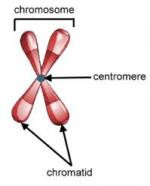|
This section contains 495 words (approx. 2 pages at 300 words per page) |

|
Human artificial chromosomes (HAC) are synthetic chromosomes that are structurally similar to normal chromosomes that, in addition to being artificially created, carry less non-gene related DNA. Because the type of genetic material used to construct human artificial chromosomes can be carefully controlled, geneticists argue that HACs will take on an increasingly important role in gene therapy. The ability to control the types of genes present on chromosomes allows scientists and clinicians the ability to introduce genes that produce specific therapeutic proteins needed to treat a specific genetic diseases.
Human artificial chromosomes must contain the same essential functional and stabilizing regions as do normal chromosomes. They must, for example contain telomeric regions at the end of each the chromosome strand. Telomeres consist of DNA and associated proteins that that function to protect chromosomes from breaks and other forms of damage. Another important element...
|
This section contains 495 words (approx. 2 pages at 300 words per page) |

|


